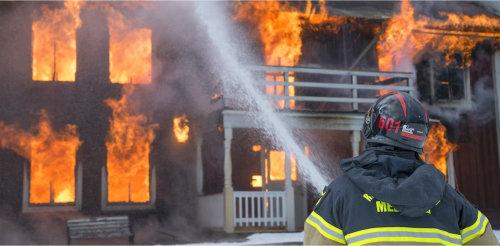A few weeks ago, there was a house fire in my town at around 12:30 in the morning, not far from where I live. Four children were sleeping at home; three of them
did not survive.
Firefighters arrived at the scene quickly, but when they did, the house was already engulfed in flames. They attempted to save these children, but the heat and flames were
just too much.
One of the victims was a senior in high school, another was a sophomore in high school, and the third was a fifth grader. The one surviving sibling is a seventh grader. It is
a devastating loss for this family and for my community.
Please keep this family in your thoughts. I can't begin to imagine what they're going through. It's going to be a long, incredibly
challenging, road ahead.
Firefighters are investigating the cause. No word on that yet. We also don't know any of the other details...like if fire detectors sounded, if there was an
emergency escape plan, if there was a window ladder, etc.
But it's tragedies like this that remind us to take every precaution we can so that a fire can be prevented...and if heaven
forbid one does start, having everything in place so you have the best chance of surviving.
Here are just a few thoughts that come to mind:
1. Smoke and Carbon Monoxide detectors. Be sure you have working smoke and carbon monoxide detectors. There should be at least one of each on each floor level, including the basement and attic; and more for larger
homes.
2. Fire extinguishers. Each home should have at least one fire extinguisher and some should have three, depending on the size of your home. Of course, these should
only be used for small fires that could be contained quickly. They are no match for large blazes. Fire extinguishers should be inspected and replaced if necessary. The life expectancy is about 10 years.
3. Fire escape plan. Devise an easy-to-understand, effective fire escape plan. Be sure your family is aware of several ways to exit the home. Practice this plan with your family at least twice a year. Get your family a window ladder or two if you live in a 2-story home and store them in the upstairs bedrooms.
4. Heating equipment. Ensure all of your heating equipment is in good repair. Faulty heating equipment or equipment that is not well-maintained is the leading cause of fires in American homes. This includes fireplaces.
5. Cooking appliances. Keep your stove, oven, and other kitchen appliances (like toasters and toaster ovens) clean.
6. Items not too close to the stove. Make sure cookbooks, pot holders, hand towels, and such aren't too close to your stove where they can catch fire.
7. Unattended cooking. Don't leave your cooking unattended. It takes seconds for a pot to boil over or for a grease fire to start.
8. Dryer lint. Remove the lint from your dryer's lint trap after every single use. And check your outside dryer vent regularly as well. Remove any lint build-up. Also, never leave the dryer running when you're not home or when you're sleeping.
9. Outlets and cords. Don't overload outlets and or ignore chewed or frayed cords caused by pets. It is much better to replace a cord than take a chance of it causing a spark that could lead to a fire.
10. Flammable items. Keep flammable products in a cool. dry place and far away from heat sources. Ask yourself if any candles are lit before you leave your house. Put your car keys near them so you don't forget to extinguish them. Don't place barbecue grills too close to your home.
11. Important phrases. Be sure everyone knows the "Stop, Drop, and Roll" and "Get Low and Go" phrases...and clearly understands what both mean. In the event of a fire, knowing these simple rhymes can help prevent severe burns and
save lives.
12. Closed doors can save lives in the event of a fire. A closed door limits the spread of smoke and the oxygen that is available for combustion. This is why it
is recommended that bedroom doors (and other home's interior doors) are closed at night when you go to sleep.
13. Acting quickly and safely. If there is a fire, immediately
yell, "FIRE!" many times. Cover your nostrils with a wet towel or a wet shirt and get everyone out as quickly as possible. Leave your valuables behind. Call 911, outside, from your cell phone or a neighbor's house.
14. Clutter. Get rid of it. The more you have, the higher the hazard that's present.
Finally, and this is a big culprit during the holiday
season...
15. Christmas hazards. About 25% of Christmas tree fires are the result of electrical problems or heat sources (electric lights, fireplaces, radiators, space
heaters, and candles) that are kept too close to the tree. Also, keep your real Christmas trees well-watered. A dry Christmas tree can go up in flames in less than 10 seconds. Be very aware of this and always have safety in mind.












